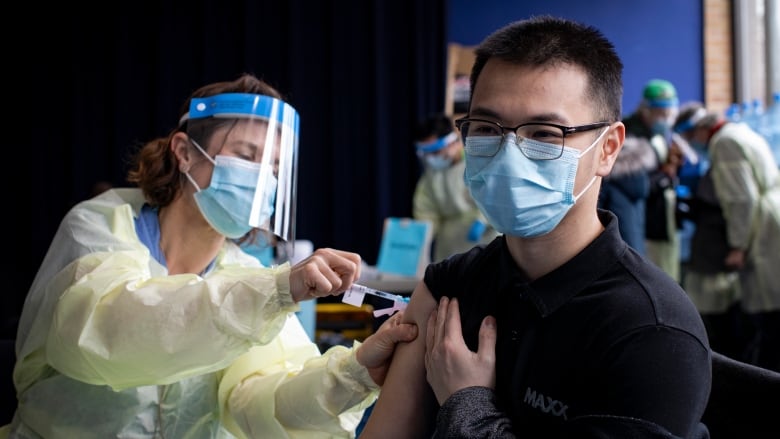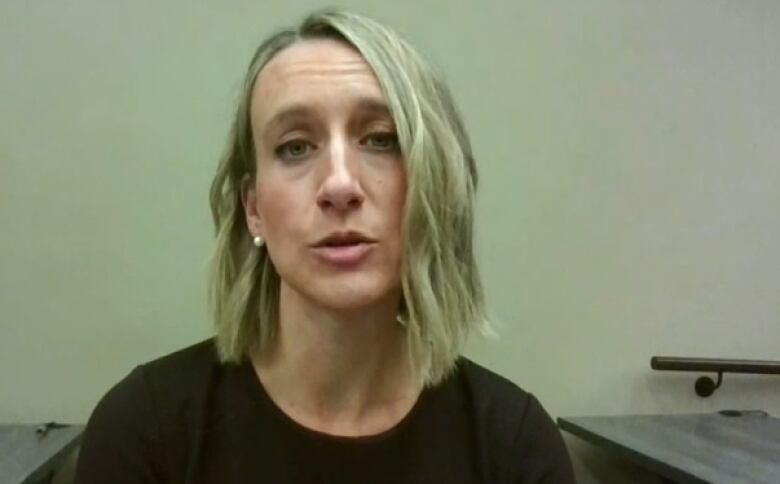Manitoba 'not finished yet' with COVID-19 vaccination efforts as province rolls back pandemic restrictions
Recent studies suggest unvaccinated who had Omicron wont be protected against future variants: Dr. Reimer

Manitoba may be moving toward lifting its COVID-19 restrictions as more than 80 per cent of its eligible population has gotten fully vaccinated but that doesn't mean the province is planning to roll back its immunization campaign anytime soon.
Dr. Joss Reimer, the medical lead of the province's vaccine implementation task force, said that's in part because of recent studies that suggest an Omicron infection doesn't provide significant protection against other strainsamong people who haven't been immunized.
As of Wednesday, 81.3 per cent of eligible Manitobans had received two doses of COVID-19 vaccine, the province's website says.
But that still leaves almost 19 per cent of people unvaccinated plus the more than 57 per cent of those eligible who haven't yet gotten their third dose.
"So even though the majority of Manitobans are well protected, we are not finished yet," Reimer said at the province's weekly virtual news conference with public health officials on Wednesday.
"The work continues, because we still need to reach those Manitobans who have not made the decision to be vaccinated."
Recent studies
Reimer outlined three recent studies that suggest unvaccinated people who get infected with the Omicron coronavirus variant won't be protected against infection from any future variants.
All three lab-based studies are preprints publishedinmedRxiv, an online portal for research that is so far unpublished and not yet peer-reviewed.
One study, which looked in the first half at mice and in the second half at humans, examined how well the blood of those who had been infected with COVID-19 could neutralize different strains of the virus that causes it, Reimer said.
That study found that unvaccinated people previously infected with Omicron may not be able to produce an immune response that protects them against other variants. But in vaccinated people, the addition of an Omicron infection may be effective at producing antibodies, she said.
Another study from Austria had almost the exact same results when looking at a group of people who were infected with Omicron, she said.
Some were vaccinated, some had been previously infected with another strain of the virus and some had neither form of protection.
Researchers in that study concluded that vaccinated people and those with a previous COVID-19 infection had high levels of antibodies produced against all of the variants.
But unvaccinated people whose first coronavirus infection was with the Omicron variant only had a low number of antibodies against Omicron and tested negative for antibodies against all other variants, Reimer said.
That led the researchers to conclude that unvaccinated people whose only form of immunity was a previous Omicron infection may not be protected well against any other variants and should be vaccinated to make sure they're protected, she said.
A third studyfrom South Africa, which included samples from 27 people, found that in unvaccinated people an Omicron infection on its own did not produce a strong immune response against any other variant, she said.
All that means that for peoplewho have gotten COVID-19 twice and vaccinated people who have gotten a breakthrough infection, "your body does make a lot of antibodies against all the variants that we've seen so far."
But it's still unclear how long those antibodies last or how well they'll work in the real world, which is why it's still important to get your next dose when you're eligible.

And while unvaccinated people who have only been infected with Omicron might be protected against that strain in the future, they likely won't be protected against other variants, she said.
"I know that there's a lot of people who may feel that now that they've had that [Omicron] infection, they're protected and they don't need to worry about things anymore. But unfortunately, these studies are showing us that that's just not the case," Reimer said.
"That's who I'm most concerned about right now, is people who are leaning on a previous Omicron infection as their only source of protection and believing that they're protected when in fact they really do still need to get the vaccine.
"We don't want people to rely on a 'you might be protected' scenario. We want people to go and get the best protection that they can."
And getting vaccinated isn't just about preventing infection it's also about protection against severe outcomes like hospitalization and death from COVID-19, which current vaccines are working very well at doing.
The National Advisory Committee on Immunization also updated its guidance this month with specific timelines for when to get vaccinated if you've gotten COVID-19 between doses.
Reimer also urged Manitobans to reach out to the people in their lives who aren't yet vaccinated to see if there's anything they can do to help them take that step, especially for people over age 50 or who have conditions like diabetes that put them at a higher risk of serious outcomes.
"Find out how you can help them to make that appointment and get out the door to be vaccinated," she said.
"Just because we're loosening restrictions does not mean that COVID-19 doesn't still pose a risk it does. But it's a risk that we are working together to learn how to manage. And we'll continue to do that with vaccines being our best tool."












_(720p).jpg)


 OFFICIAL HD MUSIC VIDEO.jpg)
.jpg)



























































































